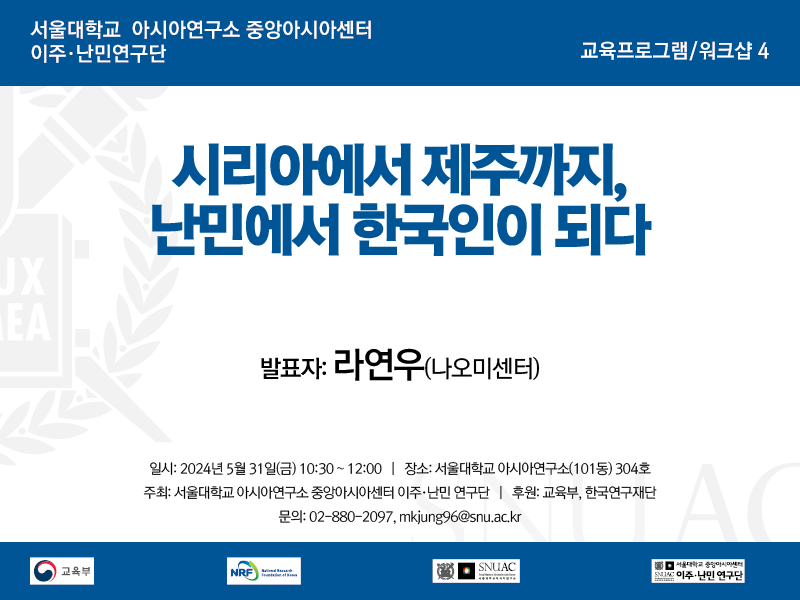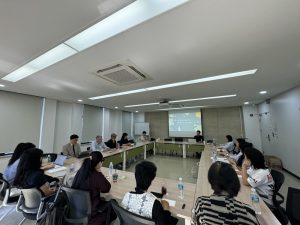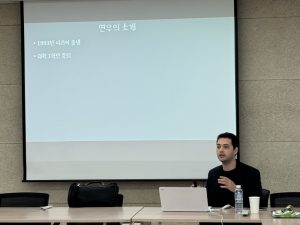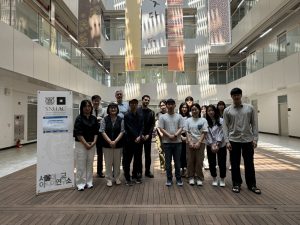
From Syria to Jeju, From Refugee to Korean
- Date: May 31st, Friday, 2024, 10:30 – 12:00
- Location: Room 304, SNUAC (Bldg. 101)
Presenter: Yeon Woo Ra (Naomi Center)
This presentation shares the experience of living as refugees in Korea, dealing with the realities and challenges of becoming Korean. By sharing an in-depth understanding of Korean society from the refugee point of view, participants will discuss the experiences of cultural differences, social adaptation, hospitality, and discrimination, in the direction of solving and enhancing the refugee situation.
The educational program began with the host, Ah-young Choi of SNUAC, introducing the speaker, Yeon Woo Ra. Currently working at the Naomi Center in Jeju, Ra is also a mentor in the Ministry of Justice’s Social Integration Mentorship Program. Born in Syria, he fled the country during the 2012 war crisis and later naturalized as a South Korean citizen.
The main lecture started with an ice-breaking quiz to impart knowledge about refugees and Korean refugee law and gauge participants’ perceptions of refugees. Following this, Ra introduced himself and explained his journey from his hometown of Aleppo to Jeju. Born in 1993 in Syria, Ra was a first-year student at Aleppo University when the civil war began. Feeling threatened by anti-government repression and military conscription, he moved to Turkey and later followed his brother to South Korea on a three-month business visa. He applied for refugee status and received humanitarian stay permission in 2014. He worked at construction sites, restaurants, and later as a barista. His sense of alienation and desire to identify as a Korean led him to participate in the KIIP social integration program. In 2018, he started working as an interpreter for Yemeni refugees, which led to his employment at the Naomi Center in 2019. After acquiring South Korean citizenship in 2020, he became a mentor for the KIIP Mentorship Program, communicating with students.
Ra then briefly explained the political situation and civil war in Syria. The Assad regime, which has maintained a dictatorship for over 50 years, is opposed by anti-government forces seeking its ouster. However, opinions vary on the direction of change post-Assad. The Free Syrian Army, which supports establishing a democratic state, is backed by Turkey, while extremist groups advocating for a state based on the Quran receive support from Saudi Arabia, and the Kurds seeking autonomy are supported by the United States. Meanwhile, Iran, Syria, China, and North Korea support the Assad regime. The IS organization, advocating for the establishment of an Islamic state without any religion, does not receive support. Additionally, Islamic traditions prohibit pork, alcohol, dating, and free expression of opinions, and there is conflict between Shia and Sunni Muslims. Ra described how discovering his girlfriend was Shia made him question his own prejudices and traditional conflicts.
Ra extended these personal experiences to broader refugee issues, explaining that refugees often move to neighboring countries or countries issuing visas not by choice but out of necessity. He urged a broader understanding of refugees, including Yemeni and Jeju refugees, and Islam, quoting Kateryna Newiazal: “If you understand the values of this country and become a representative of it, you become a German.” He shared experiences of being overlooked for orders or being the first to be blamed for mistakes at the café where he worked, and introduced the special relationship he had with a guesthouse owner who took him in and became like family. He also described the duality in Korean society’s reaction to refugees—some providing free tents while others reported it as illegal distribution—highlighting Korea’s transitional phase in adapting to refugee issues.
During the Q&A session, participants asked various questions about the lecture and Ra’s experiences. When asked if Shia and Sunni students studied together, he explained that schools were segregated by gender, and Shia students often did not disclose their identity, which is why he did not know his girlfriend was Shia initially. Regarding dietary habits and refugee life in Korea, he said that he still refrains from eating pork and drinking alcohol, which made it challenging to socialize in Korea initially. He also observed that Yemenis observe Ramadan and may take breaks from work during this period. Although he works at a Catholic church, he has had positive experiences despite not having a religious identity. When asked about a Syrian network in Jeju, he mentioned that such a network exists in Wangsimni, Seoul, mainly among business people with a traditional and conservative atmosphere.
In response to a question about the definition of refugees, Ra described them as people who have lost their homeland and cannot return until the danger in their home country ceases, in accordance with refugee law. Regarding the improvement of refugee recognition procedures, he highlighted the difficulty of providing evidence of protests and imprisonment, urging an increase in recognition rates. He explained that the higher proportion of male refugees is often due to men fleeing conscription and establishing themselves before bringing their families over. However, only five Yemeni refugees with refugee status could bring their families, while those with humanitarian stay permits could not.
The program concluded with remarks from Prof. Beomshik Shin of Seoul National University. He noted that unlike other countries, South Korea allows multiple appeals against refugee denial and actively uses humanitarian stay permits to enable refugees to work. While avoiding conscription is not easily recognized as grounds for refugee status, most refugees are produced by wars, making climate refugees a topic of ongoing debate and research. He emphasized the need for the international community to address situations where countries cannot guarantee the movement of their citizens internally. Finally, he expressed gratitude for understanding the concept of hospitality through Ra’s experiences and noted that hospitality exists within relationships, concluding the session titled “From Syria to Jeju, From Refugee to Korean.”



